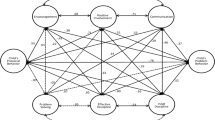Abstract
The behavioral competence of 39 preschool age maltreated children from 13 child care facilities was examined to determine the extent to which the children's behavioral development was related to the quality of child care service. Maltreated children assigned to three different types of child care facilities were observed: specialized day care programs, regular day care centers, and family day homes. Ratings of the quality of care received in child care were significantly correlated with the children's social competence in child care. Aspects of social behavior in maltreated children were related to the organization of the program, the physical facilities, traits of the caregiver, and caregiver expectations for the children.
Similar content being viewed by others
References
Broadhurst D, Edmunds M, MacDicken M:Early childhood programs and the prevention and treatment of abuse and neglect, Washington, DC: National Center on Child Abuse and Neglect, 1979.
National Center for Child Abuse and Neglect Information:Day care programs. Washington, DC, 1982.
George C, Main M: Social interactions among young abused children: Approach, avoidance, and aggression.Child Development, 50:306–318, 1979.
Cohn, A.: An evaluation of three demonstration child abuse and neglect treatment programs.Journal of the American Academy of Child Psychiatry, 18:238–291, 1979.
McQuiston M, Kempe R: Treatment of the child. In Kempe C, Helfer R (Eds.)The battered child (3rd. edition) Chicago: University of Chicago Press, 1980.
Garbarino J: What we know about child maltreatment. (unpublished manuscript), 1981.
Newberger E, Newberger C, Hampton R: Child abuse: The current theory base and future research needs.Journal of the American Academy of Child Psychiatry, 22: 262–268, 1983.
Egeland B, Sroufe A: Development sequelae of maltreatment in infancy. In Rizley R, Cicchetti D (Eds.)Developmental perspectives on child maltreatmen. San Francisco: Jossey-Bass, 1981.
Martin H: The consequences of being abused and neglected: How the ciild fares. In Kempe C, Helfer R (Eds.).The Neglected Child (3rd Edition) Chicago: Univ of Chicago Press, 1980.
Belsky J: Child maltreatment: An ecological perspective.American Psychologist,35: 320–335.
Helfer R: Developmental deficits which limit interpersonal skills. In C. Kempe and R. Helfer (Eds.),The battered child (3rd. edition). Chicago. University of Chicago Press, 1980.
Aker J, Zigler E: Developmental considerations in the definition of child maltreatment. In Rizley R, Cicchetti D (Eds.)Developmental perspectives on child maltreatment. San Francisco: Jossey-Bass, 1981.
Bloom B:Stability and change in human characteristics. New York: Wiley, 1964.
Sameroff A, Chandler M: Reproductive risk and the continuum of caretaking casualty. In HorowitzF (Ed.)Review of child development research (Vol. 4). Chicago: University of Chicago Press, 1975.
White B, Kaban B, Attanucci J, Shapiro B.Experience and Environment Englewood Cliffs, NJ: Prentice-Hall, 1978.
Behar L: The Preschool Behavior Questionnaire.Journal of Abnormal Child Psychology, 5: 265–275, 1977.
Schneider-Rosen K, Cicchetti D: The relationship between affect and cognition in maltreated infants: Quality of attachment and the development of visual self recognition.Child Development, 55: 648–658, 1984.
Caldwell B: What is the optimal environment for the young child?American Journal of Orthopsychiatry, 37: 8–21, 1967.
Wachs T, Gruen G:Early experience and human development, New York: Plenum, 1982.
McCall R, Appelbaum M, Hogarty P: Developmental change in mental performance.Monographs of the Society for Research in Child Development, 38, 1973.
Author information
Authors and Affiliations
Additional information
The research reported herein was partially funded by the Arkansas Department of Social Services.
Rights and permissions
About this article
Cite this article
Bradley, R.H., Caldwell, B.M., Fitzgerald, J.A. et al. Behavioral competence of maltreated children in child care. Child Psych Hum Dev 16, 171–193 (1986). https://doi.org/10.1007/BF00706174
Issue Date:
DOI: https://doi.org/10.1007/BF00706174



